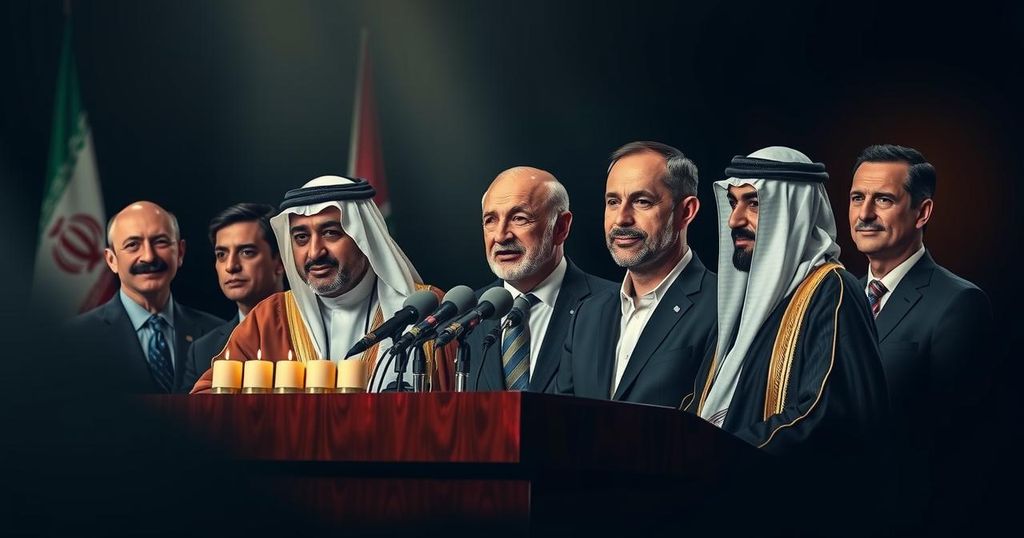Middle Eastern Nations Condemn Israel’s Military Actions Against Iran
Saudi Arabia, the UAE, and various Middle Eastern nations criticized Israel’s military strikes on Iran, labeling them as a violation of sovereignty and international law. The UAE emphasized the need for restraint and diplomatic dialogue, while Saudi Arabia warned against ongoing military conflicts that threaten regional security. Other nations like Qatar and Oman joined in expressing concern over the escalation of tensions.
On a recent occasion, Saudi Arabia, the United Arab Emirates (UAE), and several other Middle Eastern nations expressed condemnation of Israel’s military strikes targeting Iran, deeming these actions a breach of both sovereignty and international law, as reported by Gulf News. This reaction follows an announcement from the Israel Defence Forces (IDF), indicating that precise military operations were conducted against Iranian military facilities, occurring approximately one month after Iran launched around 200 ballistic missiles towards Israeli territory. In a statement from the UAE, there was a strong denunciation of Israel’s actions, expressing significant concern over the rising tensions and their potential detrimental effects on regional security and stability. The Ministry of Foreign Affairs of the UAE urged all parties to exercise maximum restraint and articulated the importance of avoiding any further escalation, reinforcing that “exercising wisdom and avoiding actions that may expand the conflict are crucial at this time.” The Emirati foreign ministry reiterated the UAE’s commitment to fostering dialogue, upholding international law, and respecting national sovereignty for the resolution of ongoing disputes, emphasizing the necessity to resolve differences through diplomatic channels, rather than through confrontation or escalation. Similarly, Saudi Arabia reaffirmed its unwavering position against the intensification of regional conflicts that threaten the collective security of nations within the area. The kingdom implored all involved parties to exercise maximum restraint and to actively pursue de-escalation of existing tensions, cautioning about the ramifications associated with prolonged military engagements within the region. In addition, Qatar, occupying a mediating role in the Gaza war, articulated its deep concern regarding the severe repercussions stemming from Israel’s recent escalation. Oman, known for its mediating efforts between Iran and Western nations, stated that Israel’s military actions only perpetuate a cycle of violence and hinder de-escalation attempts, asserting that the international community must intervene to halt such blatant violations against neighboring territories. Kuwait’s Ministry of Foreign Affairs also voiced condemnation, accusing Israel of jeopardizing regional security.
The geopolitical landscape of the Middle East has been characterized by ongoing tensions, particularly involving Israel and Iran. Recent military actions by Israel against Iranian targets have raised alarm among neighboring countries, prompting a collective response condemning potential violations of sovereignty and international law. Such military engagements come in the context of escalating conflicts and missile threats, underscoring the fragile stability of the region. The statements from nations such as Saudi Arabia, the UAE, Oman, Qatar, and Kuwait reflect a broader concern regarding the ramifications of military escalation and the importance of diplomatic resolutions.
In summary, the condemnation of Israel’s military strikes by Saudi Arabia, the UAE, and other Middle Eastern nations highlights a significant regional consensus against actions perceived as violations of sovereignty and international law. Through emphasized calls for restraint and diplomatic engagement, these nations aim to quell the rising tensions and prevent further destabilization in the region. The collective stance of various Middle Eastern nations underscores a commitment to promoting peace and security through dialogue rather than military confrontation.
Original Source: www.business-standard.com








Post Comment